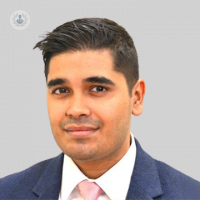Tinnitus: A complete guide
Written by:Tinnitus is a very common condition, that can present with various symptoms. In his latest online article, leading Consultant ENT surgeon Mr Kiran Varad explains tinnitus in detail, including the symptoms, diagnosis and management of the condition.

How common is tinnitus? Who is most often affected?
Tinnitus is the perception of sound in the absence of external noise. It usually manifests as a ringing or buzzing sound. It is a very common condition affecting 10-15% of people globally. Its occurrence is more prominent in older adults, with approximately 25-30% of older patients experiencing it.
Certain groups are more prone:
- Age factor: Tinnitus becomes more prevalent with age, notably affecting older adults.
- Hearing impairment: Tinnitus often accompanies hearing loss, especially in cases of age-related or noise-induced hearing problems.
- Noise exposure: People exposed to loud noises are at a heightened risk.
- Health conditions: Medical conditions like cardiovascular issues and neurological disorders can trigger tinnitus.
- Psychological impact: Stress, anxiety, and depression can worsen tinnitus symptoms.
The impact of tinnitus varies considerably with some patients having minimal impact whereas others can have a significant reduction in their quality of life and wellbeing.
What are the signs and symptoms of tinnitus?
The symptoms can vary widely in terms of intensity, frequency, and the type of sound perceived. Common signs and symptoms of tinnitus include:
- Ringing or buzzing: The most common tinnitus sound resembles a ringing or buzzing sensation. This sound can vary from a faint background noise to a loud and persistent ringing.
- Hissing or whistling: Some individuals describe their tinnitus as a hissing, whistling, or sizzling sound. This sound may come and go or remain constant.
- Clicking or pulsing: Tinnitus can manifest as rhythmic clicking or pulsing sounds that coincide with the heartbeat. This type of tinnitus is known as "pulsatile tinnitus."
- Pitch and volume variation: The pitch and volume of tinnitus sounds can vary. Some people might hear high-pitched sounds, while others experience lower-pitched tones.
- Intermittent or continuous: Tinnitus can be intermittent, occurring at certain times, or it can be continuous, persisting throughout the day.
- One-sided or both sides: Tinnitus can affect one ear (unilateral) or both ears (bilateral).
- Impact on Hearing: Tinnitus might be accompanied by hearing loss or changes in hearing sensitivity.
- Psychological impact: Tinnitus can lead to emotional distress, anxiety, and difficulty concentrating, especially when the sounds are persistent and intrusive.
- Sleep disturbance: The constant presence of tinnitus sounds can disrupt sleep, leading to insomnia or poor sleep quality.
- Aggravation by quiet environments: Tinnitus sounds are often more noticeable in quiet environments, as there are fewer external sounds to mask them.
- Triggers: Certain factors, such as stress, fatigue, caffeine, or alcohol, can exacerbate tinnitus symptoms in some individuals.
How is tinnitus diagnosed?
- The history from the patient is key to the diagnosis, particularly to look for conditions that may have tinnitus as a symptom. Some medications may also make tinnitus worse.
- Examination of the patient to look at the ears and head and neck to identify any visible issues or abnormalities that could contribute to tinnitus.
- A hearing test is paramount to determine if there is any hearing loss.
- Imaging is also considered (MRI or CT) to look for underlying causes, particularly if the tinnitus is one sided.
Can tinnitus go away on its own?
In many cases tinnitus will resolve on its own. This of course depends on the cause of the tinnitus. Temporary causes such as one-time exposure to loud noise, ear infections and increased stress may all improve once the underlying cause has resolved.

How can tinnitus be managed? What types of treatment are available?
Tinnitus management involves a range of strategies to alleviate symptoms and improve quality of life. The choice of treatment depends on the underlying cause of tinnitus, its severity, and individual preferences. Here are several approaches to tinnitus management:
- Sound therapy:
- White noise: Background white noise or nature sounds can help mask tinnitus sounds and reduce their perception.
- Tinnitus maskers: These devices generate a variety of sounds that can be adjusted to match or cover up the tinnitus sounds.
- Hearing aids: Hearing aids with built-in sound generators can amplify external sounds while providing background noise that minimizes tinnitus awareness.
- Counselling and education:
- Tinnitus retraining therapy (TRT): This combines sound therapy with counselling to help individuals habituate to tinnitus and reduce its impact on daily life.
- Cognitive behavioural therapy (CBT): CBT techniques can help manage the emotional distress and anxiety associated with tinnitus.
- Medications:
- Tricyclic antidepressants: Some antidepressants have been used to alleviate tinnitus symptoms, particularly when anxiety or depression is also present.
- Antianxiety medications: These can help manage the emotional distress related to tinnitus.
- Medications to address underlying causes: If tinnitus is linked to a specific medical condition, treating that condition might alleviate tinnitus as well.
- Lifestyle modifications:
- Noise protection: Using earplugs or earmuffs in noisy environments can prevent further damage to the ears and reduce tinnitus risk.
- Stress reduction: Managing stress through relaxation techniques, meditation, yoga, or exercise can alleviate tinnitus symptoms.
- Amplification devices:
- Hearing aids: If hearing loss is present along with tinnitus, hearing aids can enhance external sounds and help minimize tinnitus perception.
If you would like to book a consultation with Mr Varad, you can do so today via his Top Doctors profile.


